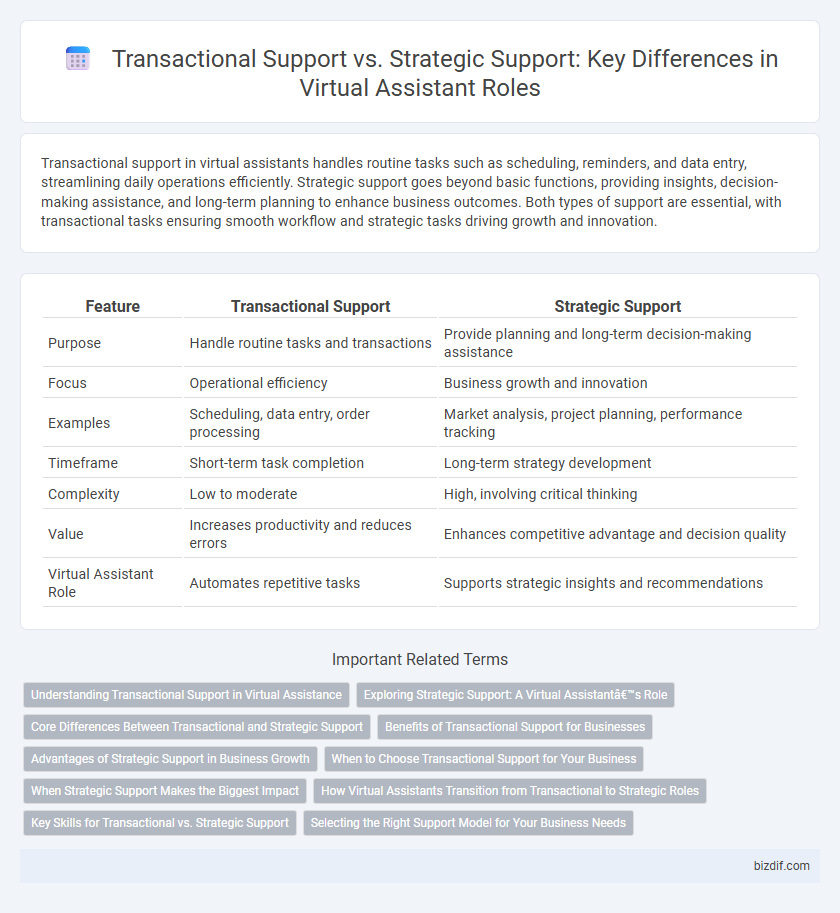Transactional support in virtual assistants handles routine tasks such as scheduling, reminders, and data entry, streamlining daily operations efficiently. Strategic support goes beyond basic functions, providing insights, decision-making assistance, and long-term planning to enhance business outcomes. Both types of support are essential, with transactional tasks ensuring smooth workflow and strategic tasks driving growth and innovation.
Table of Comparison
| Feature | Transactional Support | Strategic Support |
|---|---|---|
| Purpose | Handle routine tasks and transactions | Provide planning and long-term decision-making assistance |
| Focus | Operational efficiency | Business growth and innovation |
| Examples | Scheduling, data entry, order processing | Market analysis, project planning, performance tracking |
| Timeframe | Short-term task completion | Long-term strategy development |
| Complexity | Low to moderate | High, involving critical thinking |
| Value | Increases productivity and reduces errors | Enhances competitive advantage and decision quality |
| Virtual Assistant Role | Automates repetitive tasks | Supports strategic insights and recommendations |
Understanding Transactional Support in Virtual Assistance
Transactional support in virtual assistance involves handling routine, repetitive tasks such as scheduling, data entry, and basic customer inquiries to streamline daily operations. This type of support enhances efficiency by automating or quickly resolving straightforward requests, freeing up human resources for more complex activities. Virtual assistants designed for transactional support typically leverage AI and machine learning to execute predefined tasks with high accuracy and speed.
Exploring Strategic Support: A Virtual Assistant’s Role
Strategic support by virtual assistants involves high-level tasks such as project management, data analysis, and decision-making assistance that drive business growth and efficiency. This type of support prioritizes long-term goals, optimizing workflows and managing resources to align with organizational objectives. Virtual assistants equipped with strategic capabilities enhance productivity by anticipating needs and providing insights that inform executive strategies.
Core Differences Between Transactional and Strategic Support
Transactional support in virtual assistants centers on routine tasks such as scheduling, data entry, and responding to common inquiries, ensuring operational efficiency and quick issue resolution. Strategic support involves higher-level functions like decision-making assistance, project planning, and analytics-driven insights, which contribute to long-term business growth and innovation. Core differences lie in the scope and impact of activities: transactional support manages daily operational needs, while strategic support drives organizational objectives and competitive advantage.
Benefits of Transactional Support for Businesses
Transactional support in virtual assistants streamlines routine tasks such as appointment scheduling, order processing, and customer inquiries, significantly reducing operational costs and improving efficiency. This allows businesses to allocate human resources to higher-value activities, accelerating decision-making and enhancing overall productivity. Automating repetitive processes ensures consistent accuracy and rapid response times, strengthening customer satisfaction and retention.
Advantages of Strategic Support in Business Growth
Strategic support from virtual assistants enables businesses to optimize long-term planning, improve decision-making, and drive sustainable growth through data analysis and market insights. Unlike transactional support, which handles routine tasks, strategic assistance empowers leaders to focus on innovation and competitive positioning. Leveraging strategic virtual assistant services reduces operational inefficiencies and accelerates scalability in dynamic markets.
When to Choose Transactional Support for Your Business
Transactional support is ideal for businesses seeking efficient handling of repetitive tasks such as appointment scheduling, order processing, and customer queries, ensuring operational continuity and time savings. Companies experiencing high volumes of routine interactions benefit from transactional virtual assistants to streamline workflows and reduce human error. This approach suits businesses focused on cost-effective task automation rather than long-term strategic planning or complex problem-solving.
When Strategic Support Makes the Biggest Impact
Strategic support by virtual assistants drives business growth by analyzing market trends, optimizing workflows, and identifying long-term opportunities that extend beyond routine tasks. This type of support enables decision-makers to focus on innovation and competitive advantage rather than day-to-day transactional activities. Companies leveraging strategic assistance see improved resource allocation, enhanced project outcomes, and accelerated achievement of business objectives.
How Virtual Assistants Transition from Transactional to Strategic Roles
Virtual assistants initially excel in transactional support by automating routine tasks such as scheduling and data entry, freeing human resources for higher-level functions. They progressively transition to strategic support by leveraging AI-driven analytics and natural language processing to provide insights, optimize workflows, and assist in decision-making processes. This evolution enhances organizational agility and empowers teams to focus on innovation and long-term goals.
Key Skills for Transactional vs. Strategic Support
Transactional support requires proficiency in multitasking, data entry, calendar management, and customer interaction to ensure efficient handling of routine tasks. Strategic support demands advanced skills in project management, critical thinking, decision-making, and business analysis to contribute to long-term organizational goals. Both roles benefit from strong communication abilities, but strategic support places greater emphasis on leadership and innovation.
Selecting the Right Support Model for Your Business Needs
Transactional support in virtual assistants focuses on automating routine tasks such as scheduling, order processing, and customer inquiries, ensuring efficiency and immediate response. Strategic support, on the other hand, involves virtual assistants that help analyze data, provide insights, and assist in decision-making to drive long-term business growth. Selecting the right support model depends on your business needs--prioritize transactional support for operational efficiency, or strategic support for enhancing business strategy and competitive advantage.
Transactional support vs Strategic support Infographic

 bizdif.com
bizdif.com